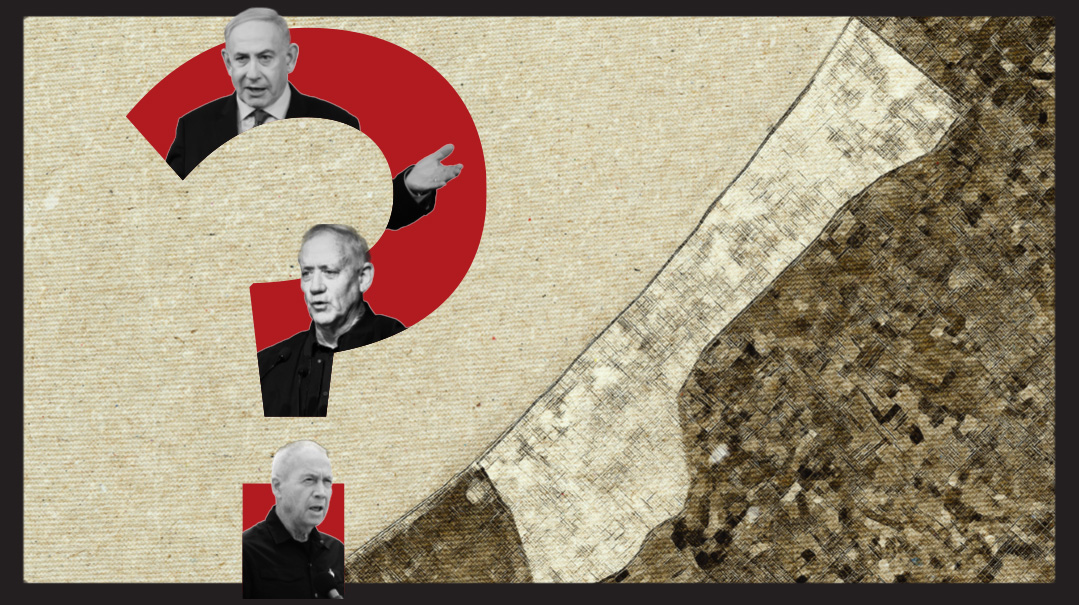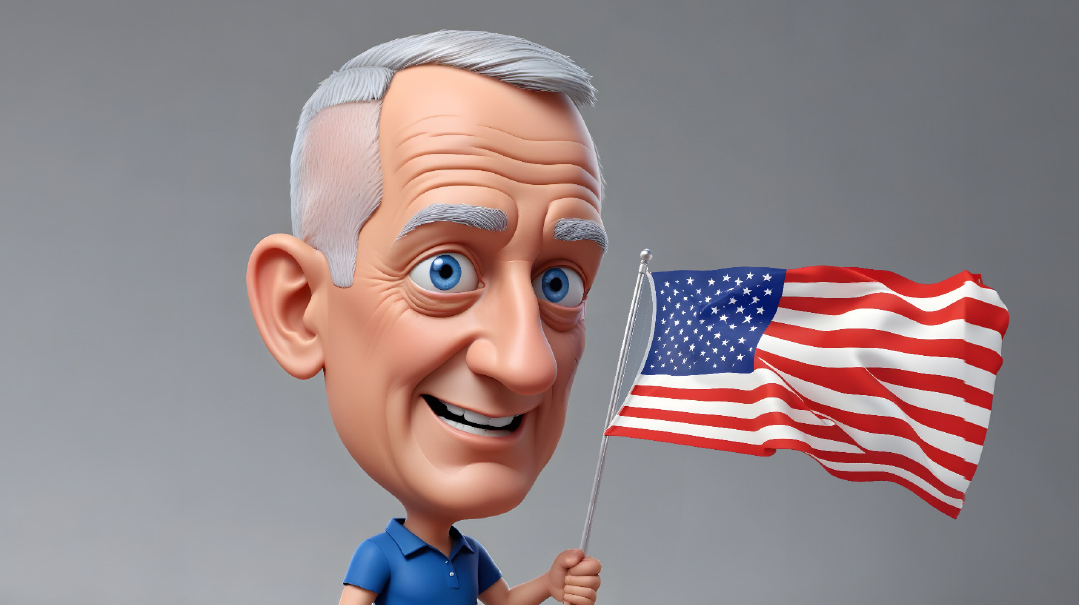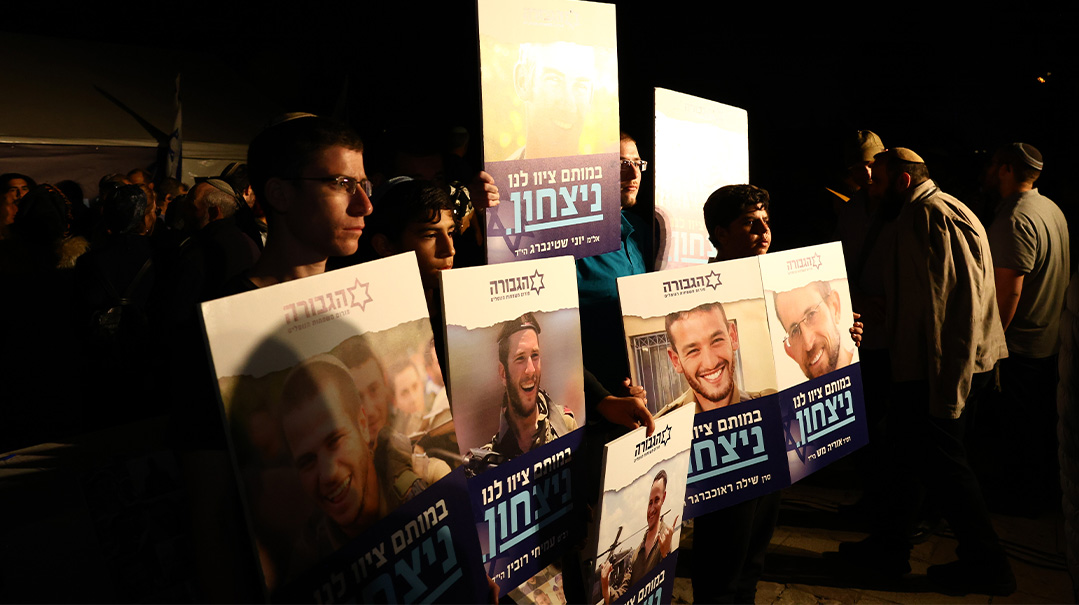Cooking Up a Coup

Vladimir Putin faced an attempted coup by his own protégé, mercenary boss, and billionaire caterer Yevgeny Prigozhin

Photos: AP Images
Over 24 hours that stunned the world, Vladimir Putin faced an attempted coup by his own protégé, mercenary boss, and billionaire caterer Yevgeny Prigozhin. As the men with guns head back to base, is this the beginning of the end for the humiliated Putin?
T
he hardened criminal boss of a bloodthirsty mercenary group decides to train his guns on his patron, advances in an armored column toward the capital to carry out a coup, while the country’s armed forces look on, paralyzed.
Stunned by the speed of the rebels’ advance and the rapid surrender of military bases — including nuclear weapons — to the mutineers, the country’s elite fall silent, hedging as they wait to see who emerges on top.
But then, as the capital’s defenders start to throw up anti-tank ditches, the warlord is bought off by the intervention of a neighboring strongman, and, as quickly as it had blown up, the crisis abates.
What sounds like the plot for a melodramatic thriller was in fact real life in Russia over 24 hours last weekend. As a shocked world looked on, Yevgeny Prigozhin, a billionaire henchman of Vladimir Putin and head of the Wagner Group, a thousands-strong mercenary force fighting on the front lines against Ukraine, announced his intention to topple Russia’s military leadership, whom he accused of mismanaging the war against Kyiv.
“We have come to get Defense Minister Shoigu and Chief of Staff Gerasimov, to end the embarrassment of what’s happening in this country,” he told the camera, while arrayed in combat gear and body armor, and surrounded by his officers. “We’re heading toward Moscow because we’re saving Russia.”
Prigozhin’s rhetoric didn’t stop there. The ultra-hawkish mercenary boss challenged Putin’s pretext for war — Ukraine had been a threat to Russia.
Prigozhin quickly captured Rostov-on-Don, a Russian city that is the main logistical hub for Moscow’s war effort, and then rapidly headed north and took the city of Voronezh. Wagner’s advance took its forces within 125 miles of the capital, and suddenly the unthinkable — the end of Putin’s regime — was being discussed.
Putin’s response was a furious, tight-lipped diatribe against his erstwhile protégé. Without mentioning Prigozhin by name, he railed against what he termed an “armed mutiny.”
Less than a day after the coup attempt had gotten underway, it was over: Belarusian strongman Aleksander Lukashenko — also a Putin protégé — stepped in to broker a deal. It included a pardon for the plotters, asylum for the Wagner boss in Belarus, and the absorption of the mercenary force in the Russian army.
Even days after the insurrection died, Kremlin leadership is lying low while the world digests the biggest threat to the Russian state since Communist hardliners attempted a coup against Soviet president Gorbachev back in 1991.
From foreign ministries to newsrooms, Kremlinologists are faced with the same questions: What triggered the short-lived coup? Why did it die an early death? And who are its winners and losers?
In the murky world that is Putin’s Kremlin, the answer to both involves the swirling network of power bases that make up Russia’s elite; in the days ahead, it will become clearer which faction backed the Wagner boss, and why it then backed off.
And most urgent of all for Russia and the international community, has Putin reestablished authority after the insurrection, or is this the beginning of the end for the humiliated strongman?
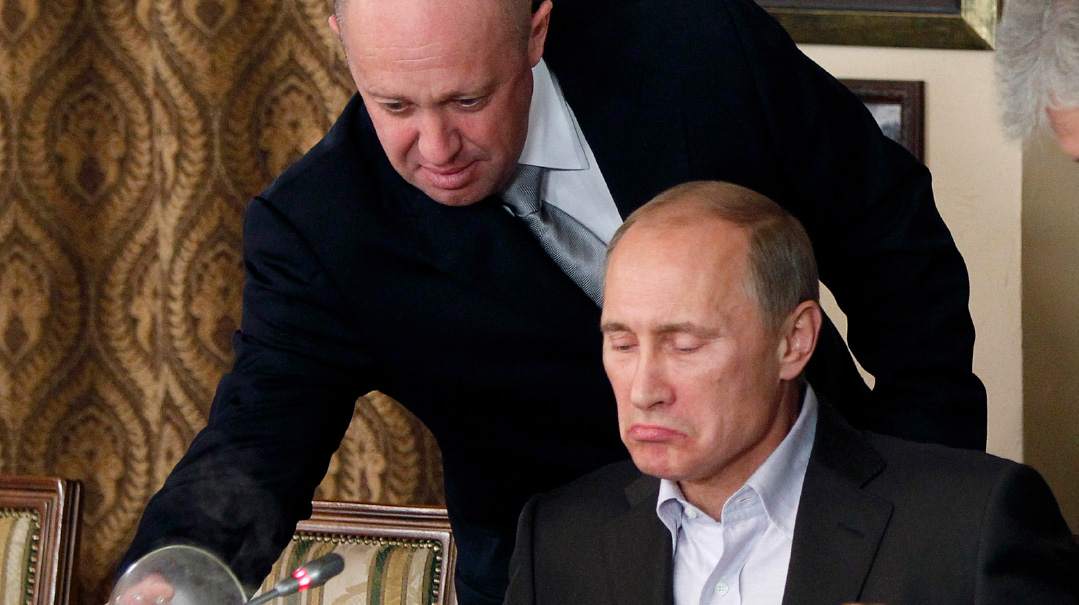
PUTIN’S CHEF Prigozhin catered to Putin’s wishes, from haute cuisine to hired guns
Putin’s Creature
The moniker “Putin’s chef” is a well-worn cliché about Yevgeny Prigozhin, the man who made his first millions providing catering services to the Kremlin, but the title has long since failed to do justice to the mercurial businessman.
A better name, says Professor Mark Galeotti, a London-based Russia expert, would be “Putin’s creature.”
“It’s Putin’s patronage that brought Prigozhin to where he is,” says Galeotti “but Putin couldn’t control his own creature. It’s a case of Dr. Frankenstein being laid low by his own handiwork.”
Prigozhin’s résumé bears out that assessment. Born on June 1, 1961, in Leningrad (now St. Petersburg) — the base for many in Vladimir Putin’s inner circle — Prigozhin’s rise to prominence began in the 1990s, when he founded an up-market restaurant that hosted visiting world leaders. The restaurant then became a successful catering business called Concord Catering, which — as Prigozhin’s relationship with Putin took off — began to receive lucrative government and military contracts.
Prigozhin’s international notoriety didn’t come via the food business, but through a farm — a troll farm, to be exact. He founded the St. Petersburg–based Internet Research Agency (IRA), a troll farm that worked to spread digital disinformation and run interference in foreign elections on Russia’s behalf.
The IRA employed hundreds of bloggers to post content criticizing the United States, smear Russian opposition figures like Alexei Navalny, and promote a positive view of Vladimir Putin.
But the IRA’s meddling was most sophisticated at exploiting political and social fault lines in the United States around and after the 2016 elections. The outfit spent large sums on social media to push left-wing voters toward Bernie Sanders — in a bid to avoid a Hilary Clinton victory, whom Russia perceived as more hostile. Whether Russian intervened on behalf of Donald Trump – as the Mueller Report alleges - has become a source of right-left political controversy in America. But at the very least, the storm was evident of Russia’s capacity to sow dissent in American public life.
The St. Petersburg bloggers also sought to foster the growing racial tension over what became the Black Lives Matter campaign, creating social media accounts to rally support for police.
As far as the Kremlin was concerned, the fact that America was distracted by this meddling was a clear win for Moscow — a low-cost victory delivered by Yevgeny Prigozhin.
Private Army
In February 2018, American soldiers faced off against Russian counterparts for the first time since the Soviet era. But unlike during the Cold War, when no shots were fired, this encounter turned hot. Over the course of a few hours, 40 special forces soldiers at a Syrian outpost fended off waves of attackers, including Russian speakers. The commandos had to fire anti-tank missiles and call in heavy airstrikes to defeat the attackers, whose target was a gas plant.
According to the New York Times, which broke the story, the attackers were the Wagner Group, then a mercenary force not widely covered by Western media.
Long before its starring role in last week’s coup, Wagner had become a household name due to its actions in Ukraine.
The mercenary outfit — one of a number of private military companies (PMCs) that work closely with Russian security services — was established in 2014 by Dmitry Utkin, a former Russian military officer and a close associate of Prigozhin. The group took its name from Utkin’s nom de guerre and began as a small security firm offering services for VIP protection and training.
Wagner’s baptism of fire was in the messy fighting that led to the breakaway of the pro-Russian separatist provinces in eastern Ukraine in 2014.
The employment of Wagner was in line with the Kremlin’s attempts to create deniability around their actions in Ukraine. The invasion of Crimea had been carried out by “little green men,” Russian special forces in unmarked uniforms with whom the Kremlin denied links. Going forward, PMCs — whose casualties didn’t show up on military records — became a weapon of choice for Putin.
After the Ukraine invasion in 2014, the Wagner Group expanded its operations to other conflict zones, particularly in the Middle East and Africa. The group has been reported to operate in Syria, Libya, Sudan, the Central African Republic, and other countries. The most prominent of the PMCs, says Mark Galeotti, was Wagner, but other power brokers, such as Gazprom, the cardon energy giant, had their own private armies.
“The advantage was that they were loyal to Putin. They provided ‘autocrats’ services,’ from VIP protection to the putting-down of the occasional insurgency.”
For years, Prigozhin denied links to the Wagner Group. But after the Ukraine invasion in 2022, he admitted founding the force.
Over the last year of combat in Ukraine, as the Russian military stumbled at every turn, Putin came to rely more and more on the mercenary force. Wagner was believed to field 50,000 troops, including 40,000 ex-convicts released from prison in exchange for military service. That total, according to Ryan Bauer and Erik Mueller of RAND Corporation, represents a tenfold increase since the start of the war.
The guns-for-hire gained a brutal reputation, including the video-recorded dismemberment of a former member who’d escaped to the Ukrainians and was subsequently recaptured.
None of that mattered to Putin, as long as Prigozhin’s mercenaries continued to fight on the front lines. As the fighting around Bakhmut in Eastern Ukraine shredded thousands of Russian soldiers, it was Wagner that did much of the fighting.
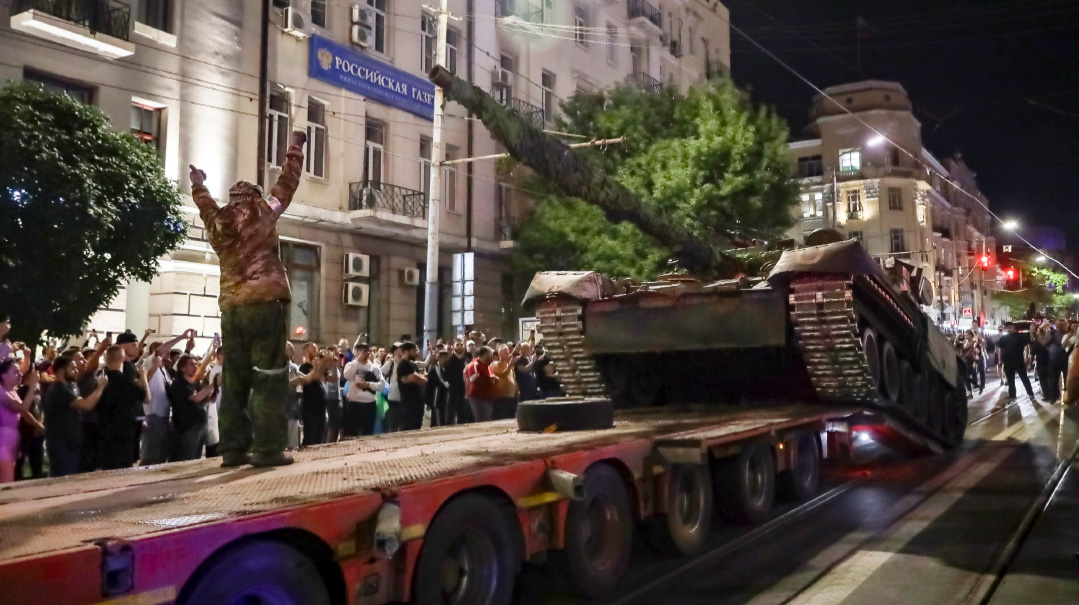
BACK TO BASE Wagner forces leave regional military base Rostov-on-Don, where they’d been warmly greeted by locals
Showdown with Shoigu
The way to insurrection for the erstwhile caterer ran through the meat-grinder that the Ukraine conflict had become. When the Russian drive on Kyiv and Ukraine’s south and east stalled last summer, Prigozhin — already a rival of Defense Minister Sergei Shoigu — went on the attack against the army command.
He railed against the corruption and uncaring attitude of Moscow’s elite, who sent off thousands to the slaughter while living it up in the capital’s upmarket districts. But as his own men were killed en masse in the battle for Bakhmut, Prigozhin changed his tune; he accused the army chiefs of starving his forces of the ammunition they needed.
Prigozhin, though, was careful not to cross the line into outright criticism of President Putin himself. Employing the age-old Russian device of “the czars are good, the boyars (barons) are bad,” the Wagner chief laid into Putin’s key lieutenants, but not the top man himself.
Shoigu, though, crossed one of Prigozhin’s own red lines, calling for Wagner to be assimilated into the Russian Defense Ministry — a move that would essentially end Prigozhin’s authority.
The Wagner boss refused, and then went one step further: Last Friday, he released a video claiming that Russian forces had struck a Wagner base.
By that stage, says Lawrence Freedman, a British expert in strategic studies, Prigozhin was skating on thin ice when it came to his old patron.
“It was assumed that Prigozhin was sufficiently close to Putin to have some latitude when it came to making a noise. Yet the sharper the criticisms, the closer they got to Putin. The accusation that the president was being kept willfully uninformed by his underlings was hardly a ringing endorsement of his leadership. He was either gullible or complicit.”
About Face
The Wagner forces that rumbled north along the M-4 highway toward Moscow took the Kremlin by surprise, generating only token resistance. There are reports of strikes against the Wagner column from the air, and the mutineers’ air defenses appear to have downed six helicopters and a command-and-control aircraft, killing as many as 13 crewmen.
The supine response, says Mark Galeotti was a throwback to the first day of the anti-Gorbachev Communist coup in 1991, when Russian officials lay low, waiting to see who would emerge victorious.
“There was the single-highest recorded number of sick days in the Moscow police forces, as officers looked for a way out from having to decide whose side they were on.”
But then came the turnaround: Professing a sudden squeamishness for the shedding of Russian blood, the warlord pressed on the brakes. He accepted the overtures of Belarus’s autocratic president Aleksander Lukashenko for a face-saving deal that would avert the threat of an armed attack on Moscow.
What led to the abrupt volte-face?
If reports that the Kremlin was threatening the lives of Prigozhin’s family members are true, that may have factored into the second thoughts. But the likely trigger, says Lawrence Freedman, is that the move didn’t draw popular support.
“Think of Benito Mussolini’s march on Rome in October 1922 to which Prigozhin’s march on Moscow was naturally compared. The Italian Fascists were a large and established party with strong support. The march itself involved 30,000 men. When they reached Rome from Naples, Prime Minister Luigi Facta wanted to resist, but the king, fearing bloodshed, would not agree, and threatened to abdicate unless Facta resigned. Mussolini did not need to seize power by force. He achieved it by the threat of force. Prigozhin’s basic problem was that he appeared to be demanding his king’s abdication but without mass support.”
Clan Struggle
In the court of Russia’s new czar, as Putin has been called, where factional struggle and intrigue dictate events across the vast country, some observers detect a deeper explanation for Prigozhin’s abrupt climbdown: clan maneuverings.
Prigozhin himself made reference to the factions he detested as he proclaimed his revolt: “What was the war for?” Prigozhin asked. “The war was needed for Shoigu to receive a hero star.… The oligarchic clan that rules Russia needed the war. They decided: ‘It’s okay, we’ll throw in a few thousand more Russian men as cannon fodder. They’ll die under artillery fire, but we’ll get what we want.’ ”
The division of Kremlin powerbrokers into warring clans is a commonplace of Russia-watching. A 2022 report published on Ukraine’s defense ministry website analyzes the extent to which personnel changes and military decisions are subordinated to the need to balance the various factions back home.
“Constant changes in the command of the occupying forces are connected with the fact that it is increasingly difficult for Putin to maintain a shaky peace between various factions in the military and political elite of the Russian Federation,” the report says.
“When Putin next makes changes in the command of the occupying forces, it has nothing in common with evaluation of the professional qualities of certain generals. Indeed, constant turbulence and uncertainty in the highest military hierarchy of the occupiers has undeniable advantages for the Russian dictator.
“First of all, none of the power clans can consolidate and strengthen enough to challenge Putin himself. Secondly, a certain balance is maintained between them, which — by design — keeps the warring clans from having their under-the-carpet feud turn into an open armed phase. Any of these arguments is much more important to Putin than the professionalism of the generals and the fighting ability of the occupying forces.”
One clan is based around the military-industrial complex, headed by Defense Minister Shoigu. Another — which is said to have backed Prigozhin — is the FSB, the country’s main security service, and a third include the GRU military intelligence allied with Chechen leader Ramzan Kadyrov.
In that reading, when Prigozhin’s patrons at court refused to make a move or withdrew their support, the Wagner leader was left with little choice but to fold.
Beginning of the End
As the mercenaries head back to their bases, and the threat of Russian civil war is averted, who are the winners and losers of the stillborn coup? With the balance of clan forces in the Kremlin still unclear, there is broad agreement that Putin has suffered a historic blow.
“It was Putin’s job to resolve the intra-elite crises that are baked into the system,” says Mark Galeotti. “He failed to step in early enough to resolve the Shoigu-Prigozhin falling-out.”
Konstantin Eggert, a Russia expert, agreed that Putin has been damaged, telling Radio Free Europe that the Russian government’s weak response was because “Putin was really afraid, and he really needed a way out. Both sides understood that for now, it is best for them to pretend that they have come to an agreement. But this elevates Prigozhin to the level of Putin. And this, of course, also hits Putin very hard.”
Whether that amounts to the “beginning of Putin’s end” narrative that some commentators were quick to announce is unclear — the Russia leader has been prematurely eulogized many times before.
Clearer, though, is the fate of the Wagner fighters. Their leader’s exile to Belarus and their absorption into the Russian military has — for the moment — accomplished Sergei Shoigu’s role of becoming Russia’s only commander in chief.
Yevgeny Prigozhin is likely kept up at night thinking of his own fate: Will he be allowed to continue his nefarious activities — leading Wagner’s international division — unharmed from Belarus, or can he expect a radioactive cup of tea or one-way trip from a window at the hands of a Kremlin assassin?
Having spent so much time at Putin’s side, the former caterer will be minded of his boss’s taste for revenge served cold.
(Originally featured in Mishpacha, Issue 967)
Oops! We could not locate your form.

